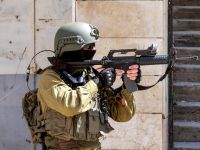U.S. President Bush said Thursday that important progress is being made in ending the violent standoff in the Middle East and declared that Israel must negotiate an end to its "occupation" of Palestinian areas in the West Bank.
Bush, speaking after meetings with European leaders, also had a message for the Palestinians, telling them the nation Americans and Europeans want to help them build must denounce terrorism.
"A Palestinian state must be achieved by negotiating an end to occupation, but such a state cannot be based on a foundation of terror or corruption," Bush said.
According to AP, Bush said he expects more progress when he meets in Washington next week with Mideast leaders including Israeli Prime Minister Ariel Sharon and Jordan's King Abdullah II.
Bush cited several recent hopeful signs in the Middle East, including a deal the United States helped broker to end Israel's siege of Palestinian leader Yasser Arafat at his compound in Ramallah. The president said work continues toward ending another standoff between the Palestinians and Israelis at the Church of the Nativity in Bethlehem.
"I'm optimistic we're making good progress," Bush said. "After all a week ago, Yasser Arafat was boarded up in this building in Ramallah. ... He's now free to show leadership."
Bush said people across the Middle East, including Arab leaders, "are beginning to assume responsibilities, and that's why I'm optimistic."
At the same time, Bush said much remains to be done, and called on Arafat to "show he can lead" and denounce terrorism. "Of course, that places responsibilities on Israel as well," Bush said.
Bush said he had been especially encouraged by his recent meeting with Saudi Crown Prince Abdullah, who U.S. officials say is now working closely with the United States to try to resolve the Mideast crisis.
"I'm absolutely convinced it's going to require the efforts of the Saudis and Jordanians and Egyptians to try to cement a lasting peace," Bush said.
European Union leaders, meeting with Bush on trade and other issues, gave their backing to the U.S. diplomatic efforts. "We attach the utmost importance to the work that we can do jointly in the Middle East," said Spanish Prime Minister Jose Maria Aznar, who currently holds the presidency of the European Union.
Earlier Thursday, Bush's spokesman gave a mild reprimand to Arafat for condemning Israelis as "terrorists, Nazis and racists" and said it would be better for all sides to focus on peace issues. "The president thinks the important step for all... parties is for them to now ask themselves what can they do to bring peace to the region, not what can they do to speak ill of others," Fleischer said when a reporter asked about Arafat's salvo.
"It's hard to assess all the facts of things that developed very rapidly on the ground," Fleischer said cautiously. "As far as the president's concerned, the violence in Bethlehem is another reason why it's so important to continue the efforts that have been made to bring peace to the region."
Fleischer also reiterated Thursday that the administration was seeking a cease-fire at the same time as a political settlement. For months, Bush sought the cease-fire as a condition of advancing political talks.
"I think what you're seeing already is an integration of security as well as political talks as a way to do both," Fleischer said. "They're both vital to bringing peace to the Middle East. It's hard to have peace in the region if there is violence. It's easier to have a comprehensive solution or interim solutions if there is less violence. And so, the two go very well together."
Jordan's Abdullah, due to meet Monday with Secretary of State Colin Powell and with Bush on Wednesday, is pushing a similar plan. In Amman on Wednesday, Abdullah said: "We must work for putting an end to the (Israeli occupation) and establishing a Palestinian state with Jerusalem as its capital." (Albawaba.com)
© 2002 Al Bawaba (www.albawaba.com)









